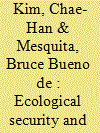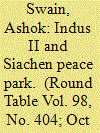| Srl | Item |
| 1 |
ID:
142092


|
|
|
|
|
| Summary/Abstract |
The quality of the ecological environment and security are trans-national and national public goods, respectively. Conceptually, there are three different causal relationships between ecology and security. First, the improvement of security may make the ecological environment better in such cases as détente, followed by environmental cooperation while the degeneration of security deteriorates the ecology in such cases as war. Second, a military confrontation may restore natural ecological systems in such cases as the Korean Demilitarized Zone. Third, ecological cooperation can result in politico-military cooperation while environmental conflict can instigate military conflict. Though the causal path from ecology to security is limited, it needs to be considered as a means to build up security and confidence. A peace park may belong to this category. The Park Geun-hye government has proposed a World Eco-Peace Park to be built inside the Korean DMZ. There is no precedent for the DMZ Peace Park to wholly imitate since no existing peace park was created without some form of prior political and military resolution. The project of the DMZ World Eco-Peace Park should be promoted while considering what facilitates its creation as well as what effect the park will have
|
|
|
|
|
|
|
|
|
|
|
|
|
|
|
|
| 2 |
ID:
090885


|
|
|
|
|
| Publication |
2009.
|
| Summary/Abstract |
The peace process between India and Pakistan, which started in 2000, moved very slowly before coming to a standstill following the terror attack on Mumbai in November 2008. This article argues that both these two South Asian neighbours need to focus on new areas of bilateral cooperation, which might help them to build mutual trust and provide much-needed impetus to bring peace in the region. The Indus River Agreement of 1960 between India and Pakistan, with its only focus on water sharing, has not been able to generate positive spin-off effects. If both the countries agree to renegotiate the Indus Agreement into an integrated river basin management mechanism, the benefit-sharing might have other peace-enhancing effects and can contribute to bilateral cooperation in other areas. Besides renegotiating the Indus Treaty, both India and Pakistan may also opt for another resource-based conflict management strategy in their tense border areas. For a quarter of a century, both these countries have been involved in an armed conflict to gain control of the Siachen glacier. If they decide to covert this disputed area as a Peace Park, it may provide an excellent exit strategy for both the armed forces-and the local people will support this move as it will give a boost to eco-tourism in the area. India and Pakistan, by establishing a Peace Park in Siachen and forming a basin-based river management institution on the Indus River, can reduce their trust deficit, which will help them to address their other long-standing bilateral contentious issues.
|
|
|
|
|
|
|
|
|
|
|
|
|
|
|
|